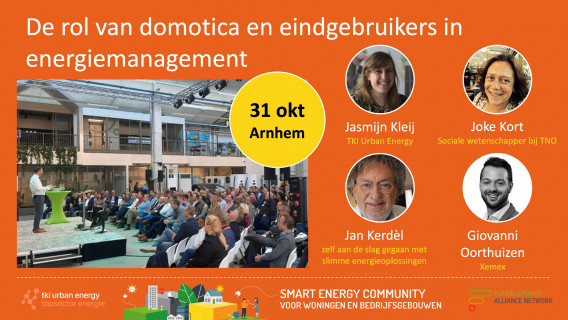Op 31 oktober organiseren FAN en TKI Urban Energy de tweede fysieke netwerkbijeenkomst van de Smart Energy Community, in het testlab van ElaadNL, Arnhem, met als onderwerp:
Domotica en Home Energy Management Systems in de praktijk
Eindgebruikers aan het woord
Hoe weerbarstig is de praktijk? Sommige eindgebruikers zijn zelf al aan de slag gegaan met domotica om hun energiegebruik slim aan te sturen. Wij laten drie van deze enthousiastelingen aan het woord: Jan Kerdel, Michiel Damoiseaux & Harm van den Brink. Wat zijn hun ervaringen? Waar liepen ze tegenaan?
Setting the scene: HEMS & Domotica
Jasmijn Kleij van TKI Urban Energy gaat in op de vraag of Domotica ook kansen op voor slim energiemanagement biedt, of dat het nu nog vooral een oplossing voor de enthousiaste knutselaars.
Praktische lessen uit Belgie
Giovanni Oorthuizen van Xemex zal een presentatie geven over de nieuwe wet- en regelgeving in België, hoe zij daarop inspelen met energiediensten, en hun ervaringen met eindgebruikers.
En verder
* Paneldiscussie over Domotica, energiemanagement en de rol van de eindgebruiker
* Speeddaten & netwerken
Aanmelden
https://www.aanmelder.nl/smartenergyday/subscribe
Volledige programma ochtendsessie:
https://www.aanmelder.nl/smartenergyday/wiki/924116/ochtendprogramma
Volledige programma middagsessie: 'Smart Energy Day 2.0', georganiseerd door TKI Urban Energy, Dutch Power, Connectr, RVO en ElaadNL
https://www.aanmelder.nl/smartenergyday/part_program
Smart Energy Community - Elaad Testlab - Arnhem





